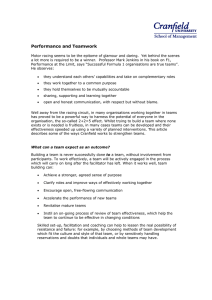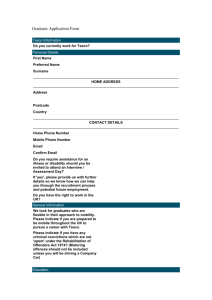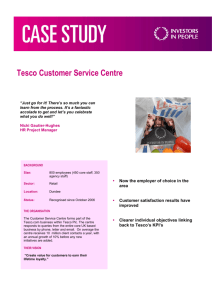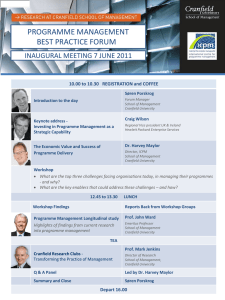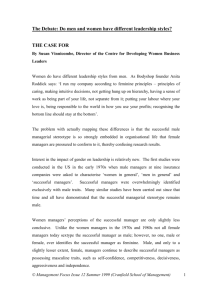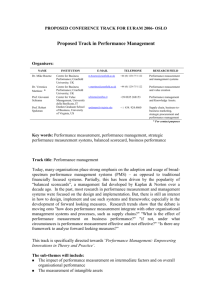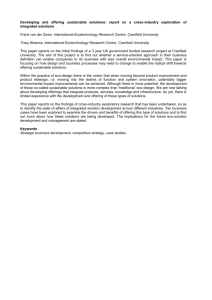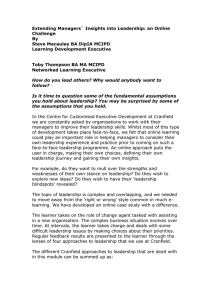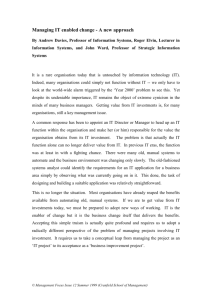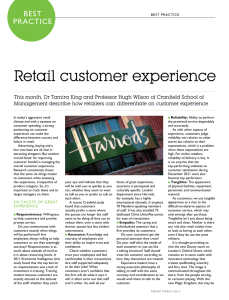Hands-on Managers Deliver - Cranfield School of Management
advertisement
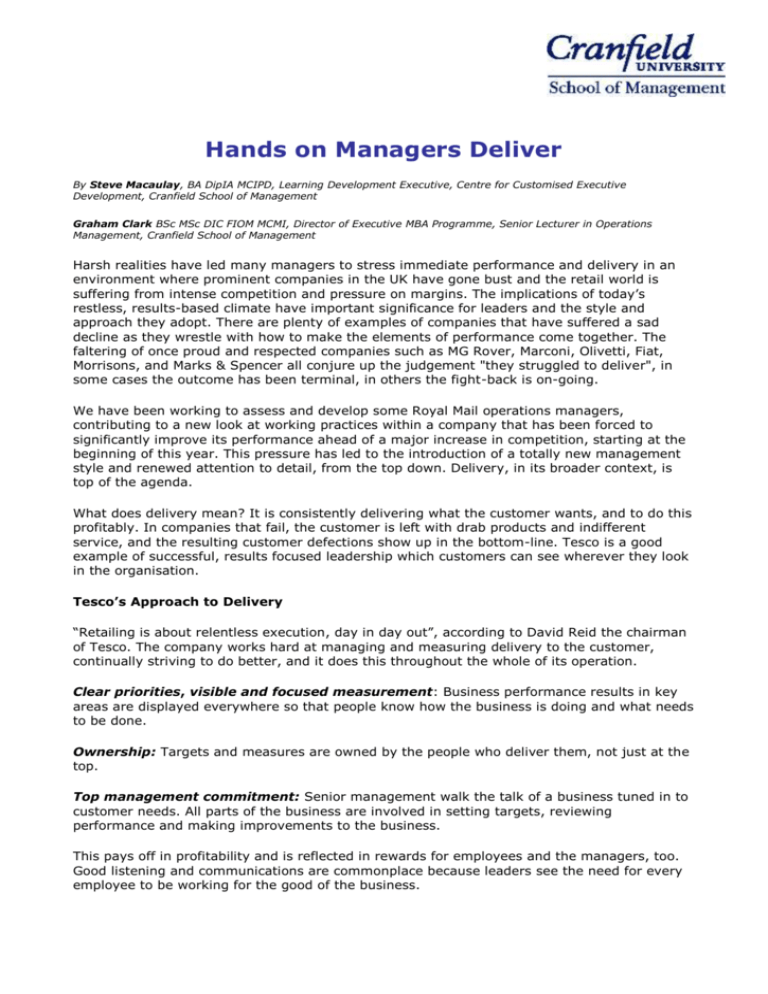
Hands on Managers Deliver By Steve Macaulay, BA DipIA MCIPD, Learning Development Executive, Centre for Customised Executive Development, Cranfield School of Management Graham Clark BSc MSc DIC FIOM MCMI, Director of Executive MBA Programme, Senior Lecturer in Operations Management, Cranfield School of Management Harsh realities have led many managers to stress immediate performance and delivery in an environment where prominent companies in the UK have gone bust and the retail world is suffering from intense competition and pressure on margins. The implications of today’s restless, results-based climate have important significance for leaders and the style and approach they adopt. There are plenty of examples of companies that have suffered a sad decline as they wrestle with how to make the elements of performance come together. The faltering of once proud and respected companies such as MG Rover, Marconi, Olivetti, Fiat, Morrisons, and Marks & Spencer all conjure up the judgement "they struggled to deliver", in some cases the outcome has been terminal, in others the fight-back is on-going. We have been working to assess and develop some Royal Mail operations managers, contributing to a new look at working practices within a company that has been forced to significantly improve its performance ahead of a major increase in competition, starting at the beginning of this year. This pressure has led to the introduction of a totally new management style and renewed attention to detail, from the top down. Delivery, in its broader context, is top of the agenda. What does delivery mean? It is consistently delivering what the customer wants, and to do this profitably. In companies that fail, the customer is left with drab products and indifferent service, and the resulting customer defections show up in the bottom-line. Tesco is a good example of successful, results focused leadership which customers can see wherever they look in the organisation. Tesco’s Approach to Delivery “Retailing is about relentless execution, day in day out”, according to David Reid the chairman of Tesco. The company works hard at managing and measuring delivery to the customer, continually striving to do better, and it does this throughout the whole of its operation. Clear priorities, visible and focused measurement: Business performance results in key areas are displayed everywhere so that people know how the business is doing and what needs to be done. Ownership: Targets and measures are owned by the people who deliver them, not just at the top. Top management commitment: Senior management walk the talk of a business tuned in to customer needs. All parts of the business are involved in setting targets, reviewing performance and making improvements to the business. This pays off in profitability and is reflected in rewards for employees and the managers, too. Good listening and communications are commonplace because leaders see the need for every employee to be working for the good of the business. Successful companies go out of their way to take on board the key message that people need to understand their business and be part of it. Successful companies recognise and manage the inevitable pressure that can be generated by relentless emphasis on standards, building a sense of community and deploying a wide range of strategies. Tesco has set up a People Insight Unit to understand staff attitudes and motivation. Mediocre performers often lack range and depth in their approach to managing the climate to keep razor sharp delivery – they run the risk of people either continually leaving the organisation, or management eventually outsourcing the whole activity. The necessary focus on delivery makes for a “hands on” leadership style. One of the biggest differences between success and failure seems that in successful deliverers there is an everpresent management, watching the detail, urging on their staff and recognising successes, picking up early on mistakes and putting them right. Injecting a sense of urgency and energy makes a substantial difference to successful delivery, coupled with sound processes and attention to detail. But it also presents a dilemma for managers that only the high-performers resolve satisfactorily: the correct balance needs to be achieved between control and allowing employees discretion and freedom to resolve issues. Rigorous control and measurement alone rarely work, as the result is a depressing modern-day sweat shop. A progressive delivery style of leadership requires managers to put energy and enthusiasm into what they do, to motivate, respond and develop as well as encourage performance. Action Points for the Delivery-Focused Leader There is no simple formula for successful delivery-focused leadership, but there are some clear pointers. For the delivery-focused leader, the bottom line has got to be important, but to achieve long term success many would agree with Tesco, that rigorous attention to customers above all, its people and operations will lead to financial success. Leaders who deliver need continuously to question their effectiveness, particularly the following: How are you making certain there is follow-through? Too many organisations have action plans that never get reviewed and fall by the wayside. Have you reviewed the balance between control of employees and discretion? Have you got the balance right for your business? Throughout your business, how are you keeping consistent focus on priorities, particularly the customer? Are you rewarding and recognising people against the key deliverables? How are you generating enthusiasm and passion for the success of the organisation at all levels? Are you maintaining and strengthening two-way communication channels – inside and outside the organisation? Are the skills of your people up-to-date and do they feel confident to make their own decisions which fit local circumstances? ****************** Steve Macaulay is a Learning Development Executive within Cranfield’s Centre for Customised Executive Development and Graham Clark is Senior Lecturer in Operations Management and Director of the Executive MBA Programme Contact: Centre for Customised Executive Development, Cranfield School of Management, Tel: +44 (0)1234 754426
